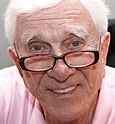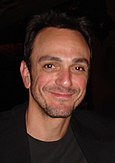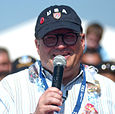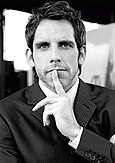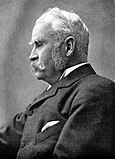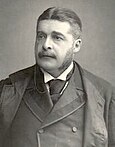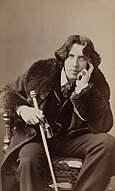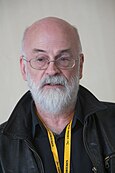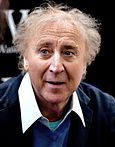Portal:Comedy/Selected biography
Instructions[edit]
The layout design for these subpages is at Portal:Comedy/Selected biography/Layout.
- Add a new Selected article to the next available subpage.
- The list should only contain articles that have been given a quality rating of Wikipedia:Featured articles or Wikipedia:Good articles.
- The "blurb" for all selected articles should be (approximately) 10 lines, for appropriate formatting in the portal main page.
- Update "max=" to new total for its {{Random portal component}} on the main page.
Selected biographies list[edit]
Portal:Comedy/Selected biography/1
Charlie Chaplin (1889–1977) was a British comic actor, filmmaker, and composer who rose to fame in the silent era. Chaplin became a worldwide icon through his screen persona "the Tramp" and is considered one of the most important figures of the film industry. His first screen appearance came in February 1914, after which he produced the popular features The Kid (1921), The Gold Rush (1925), and The Circus (1928). Chaplin refused to move to sound films in the 1930s, instead producing City Lights (1931) and Modern Times (1936) without dialogue. He became increasingly political and his next film, The Great Dictator (1940), satirised Adolf Hitler. The 1940s was a decade marked with controversy for Chaplin, and his popularity declined rapidly. Accused of communist sympathies, he was forced to leave the United States. The Tramp was abandoned in his later films, which include Monsieur Verdoux (1947), Limelight (1952), and A King in New York (1957). Chaplin wrote, directed, produced, edited, starred in, and composed the music for most of his films. His work is characterised by slapstick combined with pathos, and continues to be held in high regard.
Portal:Comedy/Selected biography/2
George Formby Sr (1875–1921) was known as one of the greatest music hall performers of the early 20th century. His comedy and songs played upon Lancashire stereotypes, and he was popular around Britain. His nickname, "The Wigan Nightingale", was coined because of the way he would use his bronchial cough as a comedic device. Born into poverty, he sang on street corners before starting a professional career in the 1890s, when he built up a following in Lancashire. He also developed a series of stage characters, including that of "John Willie", an accident-prone northerner. Formby had a successful recording career and made the transition from music hall to revue in 1916. He suffered from tuberculosis, and a stage accident in 1916 weakened him further; after he contracted influenza in the 1918 pandemic, he died in 1921 at the age of 45. Formby's act, and one of his costumes, inspired Charlie Chaplin to create the Tramp, his signature film character. Formby's son used parts of his father's act when starting his stage career and, once established, also changed his name to George Formby; he went on to become the top British male star in box office takings between 1937 and 1943.
Portal:Comedy/Selected biography/3
George Formby (1904–1961) was an English actor, singer-songwriter and comedian. On stage, screen and record he sang light, comical songs, usually playing the ukulele or banjolele, and became the UK's highest-paid entertainer. After an early career as a stable boy and jockey, Formby took to the music hall stage after the early death of his father in 1921. In 1923 he purchased a ukulele, and married Beryl Ingham, a fellow-performer who became his manager. She insisted that he appear on stage formally dressed, and introduced the ukulele to his performance. He started his recording career in 1926 and, from 1934, he increasingly worked in film to develop into a major star. During the Second World War, Formby entertained civilians and troops (pictured in France), and by 1946 it was estimated that he had performed in front of three million service personnel. After the war his career declined, although he toured the Commonwealth, and continued to appear in variety and pantomime. Formby was considered Britain's first properly home-grown screen comedian. He was an influence on future comedians—particularly Charlie Drake and Norman Wisdom—and, culturally, on entertainers such as the Beatles.
Portal:Comedy/Selected biography/4
Kenneth Horne (1907–1969) was an English comedian and businessman. His burgeoning career with the Triplex Safety Glass company was interrupted by wartime service with the Royal Air Force. While serving in a barrage balloon unit and broadcasting as a quizmaster on the BBC radio show Ack-Ack, Beer-Beer, he met the entertainer Richard Murdoch, with whom he wrote and starred in the comedy series Much-Binding-in-the-Marsh (1944–51). After demobilisation Horne returned to his flourishing business career, keeping his broadcasting as a sideline. He later became the chairman and managing director of toy manufacturers Chad Valley. In 1958 Horne suffered a stroke and gave up his business dealings to focus on his entertainment work. He was the anchor figure in Beyond Our Ken (1958–64). When the programme came to an end, he recorded four series of the comedy Round the Horne (1965–68). Before a planned fifth series, Horne died of a heart attack. A 2002 BBC radio survey to find listeners' favourite British comedian placed Horne third, behind Tony Hancock and Spike Milligan.
Portal:Comedy/Selected biography/5
Matthew Abram Groening (born February 15, 1954) is an American cartoonist and television producer and writer from Portland, Oregon. Groening is best known as the creator of The Simpsons. He is also the creator of the comic Life in Hell and co-creator of Futurama. Life in Hell caught the attention of James L. Brooks. In 1985, Brooks contacted Groening with the proposition of working in animation for the FOX variety show The Tracey Ullman Show. Originally, Brooks wanted Groening to adapt his Life in Hell characters for the show. Fearing the loss of ownership rights, Groening decided to create something new and came up with a cartoon family, the Simpsons and named the members after his own family, except Bart, which was an anagram of the word brat. The shorts would be spun off into their own series: The Simpsons, which has since aired over 400 episodes in 19 seasons. In 1997, Groening got together with David X. Cohen and developed Futurama, an animated series about life in the year 3000. After four years on the air, the show was cancelled by Fox, but Comedy Central commissioned 16 new episodes to be aired in 2008. Groening has won 10 Primetime Emmy Awards, nine for The Simpsons and one for Futurama as well as a British Comedy Award for "outstanding contribution to comedy" in 2004. In 2002, he won the National Cartoonist Society Reuben Award for his work on Life in Hell.
Portal:Comedy/Selected biography/6
Leslie William Nielsen OC (February 11, 1926 – 28 November 2010) was a Canadian-born American Emmy Award-nominated comedian and actor. He was well known for his roles as Frank Drebin in The Naked Gun, Dr. Rumack in Airplane! and most recently President Harris in the Scary Movie Series. Although Nielsen’s acting career crossed a variety of genres in both television and movies, he has achieved his greatest film success in comedies, including Airplane! and The Naked Gun series of films. His portrayal of serious characters seemingly oblivious of (and complicit in) their absurd surroundings gave Nielsen a reputation as a comedian. A series of later comedies attempted to emulate the popularity of his prior roles. This paralleled the serious roles of his early career. Leading roles in the science fiction classic Forbidden Planet and as the ship's captain in The Poseidon Adventure came long before Nielsen considered a turn to comedy. His deadpan delivery as a doctor in 1980’s Airplane! marked a turning point in Nielsen’s career, one that would make him, in the words of movie critic Roger Ebert, "the Olivier of spoofs."
Portal:Comedy/Selected biography/7
David Mitchell (born 14 July 1974) is a British actor, comedian and writer. He is one half of the comedy duo Mitchell and Webb, alongside Robert Webb, whom he met at Cambridge University. There they were both part of the Cambridge Footlights, of which Mitchell became President. Together the duo star in the Channel 4 sitcom Peep Show in which Mitchell plays Mark Corrigan. The show received a BAFTA and won three British Comedy Awards, while Mitchell won the award for Best Comedy Performance in 2009. The duo have written and starred in several sketch shows including The Mitchell and Webb Situation, That Mitchell and Webb Sound and most recently That Mitchell and Webb Look. Mitchell and Webb also starred in the UK version of Apple's Get a Mac advertisement campaign. Their first film, Magicians, in which Mitchell plays traditional magician Harry, was released on 18 May 2007. On his own, Mitchell has played Dr James Vine in the BBC1 sitcom Jam & Jerusalem and Tim in the one-off ShakespeaRe-Told adaptation of The Taming of the Shrew. He also is a frequent participant on British panel shows, including QI, Mock the Week and Have I Got News for You, as well as Best of the Worst and Would I Lie to You? on each of which he is a team captain, hosts The Unbelievable Truth and 10 O'Clock Live. Mitchell also writes a column for The Observer.
Portal:Comedy/Selected biography/8
Stephen Tyrone Colbert (born May 13, 1964) is an American comedian, satirist, actor, and writer known for his ironic style, particularly in his portrayal of uninformed opinion leaders and deadpan comedic delivery. Colbert originally studied to be an actor, but became interested in improvisational theater when he met famed Second City director Del Close while attending Northwestern University. He first performed professionally as an understudy for Steve Carell at Second City Chicago; among his troupe mates were comedians Paul Dinello and Amy Sedaris, with whom he developed the critically-acclaimed sketch comedy series Exit 57. Colbert also wrote and performed on the short-lived Dana Carvey Show before collaborating with Sedaris and Dinello again on the cult television series Strangers with Candy. He gained considerable attention for his role on the latter as closeted, gay history teacher Chuck Noblet. It was his work as a correspondent on Comedy Central's news-parody series The Daily Show, however, that first introduced him to a wide audience. In 2005, he left The Daily Show to host a spin-off series, The Colbert Report. Since its debut, the series has been successful, earning Colbert three Emmy nominations and an invitation to perform as featured entertainer at the White House Correspondents' Association Dinner in 2006. Colbert was named one of Time's 100 most influential people in 2006.
Portal:Comedy/Selected biography/9
Hank Albert Azaria (born April 25, 1964) is an American film, television and stage actor, director and comedian. He is noted for being one of the principal voice actors on the animated television series The Simpsons (1989-present), on which he performs the voices of Moe Szyslak, Apu Nahasapeemapetilon, Police Chief Clancy Wiggum, Comic Book Guy and numerous others. Azaria, who attended Tufts University, joined the show with little voice acting experience, but became a regular in its second season. Many of his characters on the show are based on famous actors and characters; Moe, for example, is based on actor Al Pacino. Alongside his continued voice acting on The Simpsons, Azaria became more widely known through his appearances in films such as The Birdcage (1996) and Godzilla (1998). He has continued to star in numerous films including Mystery Men (1999), America's Sweethearts (2001), Shattered Glass (2003), Along Came Polly (2004), Run Fatboy Run (2007), Night at the Museum: Battle of the Smithsonian (2009) and The Smurfs (2011). He also had recurring roles on the television series Mad About You and Friends and starred in the drama Huff (2004-2006), playing the titular character, to critical acclaim, as well as appearing in the popular stage musical Spamalot. Originally primarily a comic actor, in recent years Azaria has taken on more dramatic roles including the TV films Tuesdays With Morrie (1999) and Uprising (2001). He has won four Emmys and a Screen Actors Guild Award. Azaria was married to actress Helen Hunt from 1999 to 2000.
Portal:Comedy/Selected biography/10
Drew Allison Carey (born May 23, 1958) is an American comedian, actor, and game show host. After serving in the U.S. Marines and making a name for himself in stand-up comedy, Carey eventually gained popularity starring on his own sitcom, The Drew Carey Show, and serving as host on the U.S. version of Whose Line Is It Anyway?, which were aired on ABC. Carey has appeared in several films and television series, and has written an autobiography.
Carey currently hosts the game shows The Price Is Right and Power of 10, which air on CBS.
Portal:Comedy/Selected biography/11
Seth Woodbury MacFarlane (born October 26, 1973) is a two-time Emmy-winning American comedian, animator, screenwriter, producer, actor, voice actor, and composer. Born in Kent, Connecticut, MacFarlane is best known as the creator of the popular animated series Family Guy and American Dad!. He executive produced the short-lived television series The Winner. MacFarlane performs vocally as many of his cartoon characters, such as Peter Griffin on Family Guy and Roger the Alien on American Dad!. As an actor, he makes guest appearances on various shows including Gilmore Girls and The War At Home. A science fiction fan, MacFarlane has appeared on Star Trek: Enterprise, and spoofs Star Wars in several of his cartoons. MarFarlane occasionally speaks at universities and colleges throughout the United States. He supports the Democratic Party, and publicly sides with the writers union in the current Writers Guild of America strike.
Portal:Comedy/Selected biography/12
Garry Moore (born Thomas Garrison Morfit January 31, 1915–November 28, 1993) was an American entertainer, game show host and comedian, best known for his work in television. A radio personality of the 1940s, Moore was a television host on several game and variety show programs during the 1950s, 1960s and 1970s. Moore's career began in the radio industry after dropping out of high school. He moved on to the television industry following success as a radio host. Moore hosted the The Garry Moore Show, game show I've Got a Secret, and game show To Tell the Truth. His popularity on I've Got a Secret led to a movie appearance, where he played himself on the set of the show. After being diagnosed with throat cancer in 1976, Moore retired from the television industry. He spent his time in South Carolina, and his summer home in Maine during retirement. He died on November 28, 1993.
Portal:Comedy/Selected biography/13
Hattie Jacques (1922–1980) was an English comedy actress of stage, radio and screen, known to a world-wide audience through her portrayals of strict, no-nonsense characters in 14 of the Carry On films. She started her career on stage at the Players' Theatre, London, before progressing onto radio, where she appeared in three popular BBC series, It's That Man Again, Educating Archie and Hancock's Half Hour. Her cinematic debut—in Green for Danger—was brief and uncredited, but she grew to have a prolific screen career. Jacques developed a long professional stage and television partnership with Eric Sykes, with whom she co-starred in the long-running series Sykes and Sykes and a.... The role endeared her to the public and the two became staples of British television. Her private life was turbulent: she was married to the actor John Le Mesurier from 1949 until their divorce in 1965, a separation caused by her five-year affair with another man. Jacques, who had been overweight since her teenage years, suffered ill-health soon after the separation from Le Mesurier. She died in 1980 of a heart attack.
Portal:Comedy/Selected biography/14
Benjamin Edward Stiller (born November 30, 1965) is an Emmy-winning American comedian, actor, film producer and director. He is the son of veteran comedians and actors Jerry Stiller and Anne Meara. After beginning his acting career with a play, he wrote several mockumentaries, and was offered two of his own shows, both entitled The Ben Stiller Show. After acting in a few films, Stiller had his directional debut with Reality Bites, and has since written, starred, directed, and produced over fifty films and television shows. Stiller's films have grossed $1.38 billion. Stiller is a member of the comedic acting brotherhood known as the Frat Pack. With multiple cameos in music videos, television shows, and films, he may be best known for his roles in There's Something About Mary, Zoolander, Dodgeball: A True Underdog Story, Meet the Parents, its sequel Meet the Fockers, and Night at the Museum. Throughout his career, Stiller has received several awards and honors including an Emmy Award, several MTV Movie Awards, and a Teen Choice Award. Stiller's most recent role was in the film The Heartbreak Kid.
Portal:Comedy/Selected biography/15
W. S. Gilbert was an English dramatist, librettist and illustrator best known for his fourteen comic operas produced in collaboration with the composer Sir Arthur Sullivan. Gilbert's most popular collaborations with Sullivan, including H.M.S. Pinafore, The Pirates of Penzance, and The Mikado (one of the most frequently performed works in the history of musical theatre) and most of their other Savoy operas continue to be performed regularly today throughout the English-speaking world and beyond by opera companies, repertory companies, schools and community theatre groups. Lines from these works have permanently entered the English language, including "short, sharp shock", "What never? Well, hardly ever!", and "let the punishment fit the crime". Gilbert also wrote the Bab Ballads, an extensive collection of light verse accompanied by his own comical drawings. His creative output included over 75 plays and libretti, numerous stories, poems, lyrics and various other comic and serious pieces. His plays and realistic style of stage direction inspired other dramatists, including Oscar Wilde and George Bernard Shaw.
Portal:Comedy/Selected biography/16
Sir Arthur Seymour Sullivan (May 13, 1842 – November 22, 1900) was an English composer best known for his operatic collaborations with librettist W. S. Gilbert, including the still-popular H.M.S. Pinafore, The Pirates of Penzance, and The Mikado. Sullivan's artistic output included 23 operas, 13 orchestral works, eight choral or oratorio works, two ballets, incidental music to several plays, and numerous hymns and other church pieces, songs, parlour ballads, part songs, carols, and piano and chamber pieces. Apart from his comic operas with Gilbert, Sullivan is best known for some of his hymns and parlour songs, including "Onward Christian Soldiers", "The Absent-Minded Beggar", and "The Lost Chord". However, his most critically praised pieces include his Irish Symphony, his Concerto for Cello and Orchestra, his Overture di Ballo, The Martyr of Antioch, The Golden Legend, and, of the Savoy Operas, The Yeomen of the Guard. Sullivan's only grand opera, Ivanhoe, was initially successful but has been little heard since his death.
Portal:Comedy/Selected biography/17
Oscar Fingal O'Flahertie Wills Wilde (October 16, 1854 – November 30, 1900) was an Irish playwright, novelist, poet, and short story writer. Known for his barbed wit, he was one of the most successful playwrights of late Victorian London, and one of the greatest celebrities of his day. As the result of a famous trial, he suffered a dramatic downfall and was imprisoned for two years of hard labour after being convicted of the offence of "gross indecency". The lawyer H. Montgomery Hyde suggests this term implies homosexual acts not amounting to buggery in British legislation of the time. Wilde was born into an Anglo-Irish family, at 21 Westland Row, Dublin, to Sir William Wilde and his wife Jane Francesca Elgee. Jane was a successful writer and an Irish nationalist, known also as 'Speranza', while Sir William was Ireland's leading ear and eye surgeon, and wrote books on archaeology and folklore. He was a renowned philanthropist, and his dispensary for the care of the city's poor, in Lincoln Place at the rear of Trinity College, Dublin, was the forerunner of the Dublin Eye and Ear Hospital, now located at Adelaide Road.
Portal:Comedy/Selected biography/18
Sir Terence David John Pratchett, OBE (born 28 April 1948) is a British fantasy and science fiction author, best known for his Discworld series. The Discworld series is a humorous and often satirical fantasy work that uses the Discworld as an allegory for our everyday life. Other works include the Johnny Maxwell Trilogy and The Nome Trilogy. He also closely collaborates on adaptations of his books, such as computer games and plays. Pratchett started to write by the age of 13 and his first work was published commercially at the age of 15. His first novel The Carpet People was published in 1971. The first Discworld novel The Colour of Magic was published in 1983 and since then, he has written two books a year on average. Pratchett was the UK's best selling author in the 1990s. Pratchett's novels hold the record for the most shoplifted books in Britain. Pratchett was named an Officer of the Order of the British Empire in 1998 "for services to literature". His novel The Amazing Maurice and his Educated Rodents won the 2001 Carnegie Medal for the best book for children. Pratchett and his work are often described as having a cult following.
Portal:Comedy/Selected biography/19
Bruno Maddox is a British literary novelist and journalist who is best-known for his critically lauded novel My Little Blue Dress (2001) and for his satirical magazine essays. After graduating from Harvard University in 1992, Maddox began his career reviewing books for The New York Times Book Review and The Washington Post Book World. In early 1996, he was appointed to an editorship at SPY magazine and within a few months he was promoted to editor-in-chief, a position he held until the magazine shut down in 1998. Maddox wrote My Little Blue Dress between 1999 and 2001. Since its publication, he has focused on writing satirical essays for magazines such as GEAR and Travel + Leisure; he also contributes a monthly humor column to Discover magazine called "Blinded by Science", drawing on his early exposure to science and technology. Maddox is likewise a contributing editor to the American edition of The Week magazine.
Portal:Comedy/Selected biography/20
John Le Mesurier (1912–83) was an English actor perhaps best remembered for his comedic role as Sergeant Arthur Wilson in the BBC situation comedy Dad's Army between 1968 and 1977. He debuted on stage in 1934, and became one of television's pioneering actors when he appeared in The Marvellous History of St Bernard in 1938. From there, Le Mesurier had a prolific film career and appeared in over 120 films across a range of genres, normally in smaller supporting parts in comedies; his roles often portrayed figures of authority such as army officers, policemen and judges. He took a relaxed approach to acting and described himself as a "jobbing actor", a term he used for the title of his autobiography. On one of the few occasions he played the lead role in his career, he received a British Academy of Film and Television Arts "Best Television Actor" award for his performance in the Dennis Potter television play Traitor. He later said that the parts he played were those of "a decent chap all at sea in a chaotic world not of his own making". After his death, critics reflected that for an actor who normally took minor roles, the viewing public were "enormously fond of him".
Portal:Comedy/Selected biography/21
Malcolm Hardee (born Lewisham, London, January 5, 1950 – died Rotherhithe, London, January 31, 2005) was an English comedian, author, comedy club proprietor, compère, agent, manager and "amateur sensationalist". His high reputation among his peers rests on his outrageous publicity stunts and on the help and advice he gave to successful British alternative comedians early in their careers as "godfather to a generation of comic talent in the 1980s". Though an accomplished comic, Hardee was arguably more highly regarded as a 'character', a compère and talent-spotting booker at his own clubs, particularly The Tunnel Club in Greenwich, southeast London, which gave vital and early exposure to up-and-coming comedians during the early years of British alternative comedy. In its obituary, The Times of London opined that "throughout his life he maintained a fearlessness and an indifference to consequences" and one journalist claimed: "To say that he has no shame, is to drastically exaggerate the amount of shame that he has". In a publicity quote printed in Hardee's autobiography I Stole Freddie Mercury's Birthday Cake, Arthur Smith wrote that Hardee had "led his life as though for the perfect autobiography and now he has paid himself the compliment of writing it."
Portal:Comedy/Selected biography/22
Hugh Grant (born 9 September 1960) is a Golden Globe-winning British actor and film producer. Grant achieved international stardom after playing the alter ego of writer-director Richard Curtis in the sleeper hit Four Weddings and a Funeral (1994). He used this breakthrough role as a frequent cinematic persona during the 1990s to deliver comic performances in mainstream films like Mickey Blue Eyes (1999) and Notting Hill (1999). He established himself, by the turn of the 21st century, as a prominent leading man skilled with a satirical comic talent. In recent years, Grant has expanded his oeuvre with critically acclaimed turns as a cad in Bridget Jones's Diary (2001), About A Boy (2002), and American Dreamz (2006). Grant has been criticised by students of cinema for putting emphasis on nuanced mannerisms, for the predictability of his movies, and for his unwillingness to stretch as an actor. Within the film industry, he is cited as a movie star who approaches his roles like a character actor, with the ability to make acting look effortless. Hallmarks of his patented comic skills include a nonchalant touch of irony/sarcasm and studied physical mannerisms as well as his precisely-timed dialogue delivery and facial expressions. In a career spanning 20 years, Grant has repeatedly claimed that acting is not a true calling but just a job he fell into, while his movies have earned more than $2.4 billion from 25 theatrical releases worldwide.
Portal:Comedy/Selected biography/23
Gene Wilder (born Jerome Silberman, June 11, 1933) is an Emmy Award-winning and twice Academy Award-nominated American stage and screen actor, director and screenwriter. Wilder began his career on stage, making his screen debut in 1967. His first major role was as Leo Bloom in the 1968 film, The Producers. This was the first in a series of prolific collaborations with writer/director Mel Brooks, including 1974's Young Frankenstein, the script of which garnered the pair an Academy Award for Best Adapted Screenplay nomination. Wilder is known for his portrayal of Willy Wonka on Willy Wonka & the Chocolate Factory (1971) and for his four films with Richard Pryor: Silver Streak (1976), Stir Crazy (1980), See No Evil, Hear No Evil (1989), and Another You (1991). Wilder has directed and written several of his films, including The Woman in Red (1984). His marriage to actress Gilda Radner, who died from ovarian cancer, led to his active involvement in promoting cancer awareness and treatment, helping found the "Gilda Radner Ovarian Cancer Detection Center" in Los Angeles and co-founding Gilda's Club. In more recent years, Wilder turned his attention to writing, producing a memoir in 2005, Kiss Me Like A Stranger: My Search for Love and Art, and the novels My French Whore (2007) and The Woman Who Wouldn't (2008).
Portal:Comedy/Selected biography/24
Dan Leno (1860–1904) was a leading English music hall comedian and musical theatre actor during the late Victorian era. He was perhaps best known, aside from his music hall act, for his dame roles in the annual pantomimes that were popular at London's Theatre Royal, Drury Lane from 1888 to 1904. As a youth, he was famous for his clog dancing, and in his teen years, he became the star of his family's act. As a solo artist, he became increasingly popular during the late 1880s and 1890s, when he was one of the highest-paid comedians in the world. He developed a music hall act of talking about life's mundane subjects, mixed with comic songs and surreal observations, and created a host of mostly working-class characters to illustrate his stories. In 1901, still at the peak of his career, he performed his "Huntsman" sketch for Edward VII at Sandringham. The monarch was so impressed that Leno became publicly known as "the king's jester". Leno continued to appear in musical comedies and his own music hall routines until 1902, although he suffered increasingly from alcoholism. This, together with his long association with dame and low comedy roles, prevented him from being taken seriously as a dramatic actor. He suffered a mental breakdown in early 1903 and was committed to a mental asylum, but was discharged later that year. After one more show, his health declined, and he died aged 43.
Portal:Comedy/Selected biography/25
Lawrence Gene David, (born July 2, 1947 in Brooklyn, New York) better known as Larry David, is an Emmy-winning actor, writer, comedian, television producer and film director. Formerly a stand-up comedian, David went into television comedy, writing and starring in his own series called Fridays, as well as writing briefly for Saturday Night Live. David is one of the most respected and successful comedians of recent years. He was voted by other comedians as the 23rd greatest comedian of all time in the British Channel 4 The Comedians Comedian poll. In 1989, he teamed up with Jerry Seinfeld to co-create the television series Seinfeld, where he also acted as head writer and executive producer. His work won David a Primetime Emmy Award for Outstanding Comedy Series in 1993. In 1999, he created and starred in the HBO series Curb Your Enthusiasm, an improvised sitcom in which he plays a fictionalized version of himself.
Portal:Comedy/Selected biography/26
Bernadette Peters (born February 28, 1948) is an American actress and singer from New York City. Over the course of a career that has already spanned five decades, she has starred in musical theatre, films and television, as well as performing in solo concerts and recordings. She is one of the most critically-acclaimed Broadway performers, having received nominations for seven Tony Awards, winning two, and eight Drama Desk Awards, winning three. Four of the Broadway cast albums on which she has starred have won Grammy Awards. She was praised for her early work as a child and teenage actor and for appearances on The Muppet Show, The Carol Burnett Show and in other television work, and for her comic characters in films like Silent Movie, The Jerk and Pennies from Heaven. In the 1980s she returned to the theatre, where she became one of the best-known Broadway stars over the next three decades. She also has recorded six solo albums and several singles, as well as many cast albums and performs regularly in her own concert act. Peters also continues to act in films and on television, where she has been nominated for three Emmy Awards and three Golden Globe Awards, winning once. Peters is particularly noted for her starring roles in stage musicals, including Song and Dance, Sunday in the Park with George, Into the Woods, Annie Get Your Gun, and Gypsy, becoming closely associated with composer Stephen Sondheim.
Portal:Comedy/Selected biography/27
Phil Hartman (September 24, 1948 – May 28, 1998) was a Canadian-born American actor, comedian, screenwriter, and graphic artist. Born in Brantford, Ontario, Hartman and his family immigrated to the United States when he was ten. After graduating from California State University, Northridge with a degree in graphic arts, he designed album covers for bands like Poco and America. Feeling the need for a more creative outlet, Hartman joined the comedy group The Groundlings in 1975 and there helped comedian Paul Reubens develop his character Pee-wee Herman. Hartman co-wrote the screenplay for the film Pee-wee's Big Adventure and made recurring appearances on Reubens' show Pee-wee's Playhouse. Hartman became well-known in the late 1980s when he joined the sketch comedy show Saturday Night Live. He won fame for his impressions, particularly of President Bill Clinton, and stayed on the show for eight seasons. Called "the Glue" for his ability to hold the show together and help other cast members, Hartman won a Primetime Emmy Award for his SNL work in 1989. In 1995, after scrapping plans for his own variety show, he starred as Bill McNeal in the NBC sitcom NewsRadio. He also had frequent roles on The Simpsons as Lionel Hutz, Troy McClure and others, and appeared in the films Houseguest, Sgt. Bilko, Jingle All the Way, and Small Soldiers. Hartman had been divorced twice before he married Brynn (née Omdahl) in 1987; the couple had two children together. However, their marriage was fractured, due in part to Brynn's drug use. On May 28, 1998, Brynn shot and killed her husband while he slept in their Encino, Los Angeles home, then committed suicide several hours later.
Portal:Comedy/Selected biography/28
Jonathan Niven "Jon" Cryer (born April 16, 1965) is an American actor, screenwriter and film producer. He is the son of actress/singer Gretchen Cryer. He made his motion picture debut by starring in the 1984 romantic comedy No Small Affair, but gained greater fame by starring as "Duckie" in the John Hughes film Pretty in Pink. In 1998 he finished writing and producing the independent film Went to Coney Island on a Mission From God... Be Back by Five, which was well received. Even though Cryer gained some fame by starring in these movies, he had not found television success; the shows he had starred in (The Famous Teddy Z, Partners and The Trouble with Normal) all did not last very long, until, in 2003, he was cast to portray Alan Harper on the CBS hit comedy series Two and a Half Men, opposite Charlie Sheen. To date, the actor has received three Emmy Award nominations for Outstanding Supporting Actor in a Comedy Series for his work on the show.
Portal:Comedy/Selected biography/29
David Lawrence Schwimmer (born November 2, 1966) is an American actor and director of television and film. Born in New York, he moved to Los Angeles at the age of two. Several years later, he began his acting career performing in school plays at Beverly Hills High School. In 1988 he graduated from Northwestern University with a Bachelor of Arts degree in theater and speech. After graduation, Schwimmer co-founded the Lookingglass Theatre Company. For much of the late-1980s, he lived in Los Angeles as a struggling, unemployed actor. He appeared in the television movie A Deadly Silence in 1989. He then appeared in a number of television roles, including L.A. Law, The Wonder Years, NYPD Blue, and Monty in the early-1990s. Schwimmer later gained worldwide recognition for playing Ross Geller in the situation comedy Friends. Aside from appearing in television, he starred in his first feature film The Pallbearer (1996), which was followed by roles in Kissing a Fool (1998), Six Days Seven Nights (1998), Apt Pupil, and Picking Up the Pieces (2000). He was then cast in the War miniseries Band of Brothers (2001). Following the series finale of Friends in 2004, Schwimmer landed the role of the titular character in the 2005 drama Duane Hopwood. Other film roles include the computer animated film Madagascar (2005), the dark comedy Big Nothing (2006), the thriller Nothing But the Truth (2008), and Madagascar: Escape 2 Africa (2008). Schwimmer made his London stage debut in the leading role in Some Girl(s) in 2005, for which he received critical reviews. In 2006 he made his Broadway debut in The Caine Mutiny Court-Martial. Schwimmer made his directorial debut with the 2008 comedy Run Fatboy Run.
Portal:Comedy/Selected biography/30
Nancy Campbell Cartwright (born October 25, 1957) is an American film and television actress, comedienne and voice artist. Noted for her long-running role as Bart Simpson on the animated television series The Simpsons, she also voices other characters for the show, including Nelson Muntz, Ralph Wiggum, Todd Flanders, Kearney and Database. Born in Dayton, Ohio, Cartwright moved to Hollywood in 1978 and trained as a voice actress alongside Daws Butler. Her first professional role was voicing Gloria in the animated series Richie Rich, which she followed up with a starring role in the television movie Marian Rose White and her first feature film in Twilight Zone: The Movie in 1983. Cartwright continued to audition for voice-over and live-action roles, and in 1987, she decided to audition for a role in a series of animated shorts about a dysfunctional family on The Tracey Ullman Show. Cartwright intended to audition for the role of Lisa Simpson, the eldest daughter; however, when she arrived at the audition, she found the role of her brother Bart to be much more interesting. Matt Groening, creator of the shorts, allowed her to audition for Bart, and gave her the job on the spot after hearing her read. For her work as Bart, Cartwright would receive a Primetime Emmy Award for Outstanding Voice-Over Performance in 1992 and an Annie Award for Best Voice Acting in the Field of Animation in 1995.
Portal:Comedy/Selected biography/31
Julie Deborah Kavner (born September 7, 1950) is an American film and television actress, comedienne and voice artist. Noted for her long-running role as Marge Simpson on the animated television series The Simpsons, she also voices other characters for the show, including Patty and Selma Bouvier. Born in Los Angeles, Kavner grew up in Southern California, attending Beverly Hills High School and later San Diego State University. Kavner was cast in her first professional acting role as Brenda Morgenstern in Rhoda in 1974. She received a Supporting Actress in a Comedy Series Primetime Emmy Award in 1978 and several more award nominations for playing the character. Following Rhoda, Kavner was cast in The Tracey Ullman Show, which debuted in 1987. The Tracey Ullman Show included a series of animated shorts about a dysfunctional family. Voices were needed for the shorts, so the producers decided to ask Kavner to voice Marge. The shorts would eventually be spun-off into The Simpsons. Kavner has been described as "nearly reclusive"; part of her contract says that she will never have to promote The Simpsons on video. For her work as Marge, Kavner received a Primetime Emmy Award for Outstanding Voice-Over Performance in 1992 and an Annie Award nomination for her performance as the character in The Simpsons Movie. In 1992, she starred in This Is My Life, her first leading role in a feature film. Kavner has also appeared in live-action roles in seven films written by Woody Allen and, most recently, Click.
Portal:Comedy/Selected biography/32
Daniel Louis "Dan" Castellaneta (born October 29, 1957) is an American film, theatre and television actor, comedian, voice artist and television writer. Noted for his long-running role as Homer Simpson on the animated television series The Simpsons, he also voices many other characters on The Simpsons, including Abraham "Grampa" Simpson, Barney Gumble, Krusty the Clown, Groundskeeper Willie, Mayor Quimby and Hans Moleman. Born in the Chicago suburb of Oak Park, Illinois, Castellaneta started taking acting classes at a young age. He would listen to his father's comedy records and do impressions of the artists. After graduating from Northern Illinois University, Castellaneta joined Chicago's Second City in 1983, and performed with the troupe until 1987. He was cast in The Tracey Ullman Show, which debuted in 1987. The Tracey Ullman Show included a series of animated shorts about a dysfunctional family. Voices were needed for the shorts, so the producers decided to ask Castellaneta to voice Homer. His voice for the character started out as a loose impression of Walter Matthau, but later evolved into a more robust voice. The shorts would eventually be spun off into The Simpsons. Castellaneta has won three Primetime Emmy Awards for Outstanding Voice-Over Performance for his work on the show as well as an Annie Award for Outstanding Individual Achievement in the Field of Animation in 1993. Along with his wife Deb Lacusta, Castellaneta has written four episodes of The Simpsons.
Portal:Comedy/Selected biography/33
Yeardley Smith (born July 3, 1964) is a French-born American actress, voice artist, writer and painter. She is best known for her long-running role as Lisa Simpson on the animated television series The Simpsons. Born in Paris, France, her family moved Washington, D.C. in 1966. As a child, Smith was often mocked because of her unusual first name and her voice. She became a professional actress in 1982 after graduating from drama school and moved to New York City in 1984 where she appeared in the Broadway production of The Real Thing. Her first film role came in 1985's Heaven Help Us, followed by roles in The Legend of Billie Jean and Maximum Overdrive. She moved to Los Angeles, California in 1986 and received a recurring role in the television series Brothers. In 1987, she auditioned for a role in a series of animated shorts about a dysfunctional family on The Tracey Ullman Show. Smith intended to audition for the role of Bart Simpson, but the casting director felt her voice was too high so she was given the role of Lisa instead. She voiced Lisa for three seasons on The Tracey Ullman Show, and in 1989, the shorts were spun off into a half hour show called The Simpsons. For her work as the character, Smith received a Primetime Emmy Award for Outstanding Voice-Over Performance in 1992.
Portal:Comedy/Selected biography/34
George Robey (1869–1954) was an English comedian, singer and actor in musical theatre, known as one of the greatest music hall performers of the late 19th and early 20th centuries. Robey mixed everyday situations and observations with comic absurdity, and was a popular Christmas pantomime performer. His notable successes during the First World War included the hit revue The Bing Boys Are Here, in which he sang "If You Were the Only Girl (In the World)". Born in London to a middle-class family, he made his debut on stage at age 21 as the straight man to a comic hypnotist. He soon developed his own music hall act. In 1892, he appeared in his first pantomime, Whittington Up-to-date. He starred in the Royal Command Performance in 1912 and regularly entertained before aristocracy. In 1913 he debuted in film, but with only modest success. From 1918, he created sketches based on his character, the Prime Minister of Mirth. He played Falstaff in Henry IV, Part 1 in 1935, and again in Laurence Olivier's 1944 film of Henry V. During the Second World War, Robey raised money for charities and promoted recruitment into the forces. He was knighted a few months before his death.
Portal:Comedy/Selected biography/35
Red Skelton (1913–1997) was an American entertainer known for his national radio and television acts. He began developing his comedic and pantomime skills at age 10 in a traveling medicine show. Over the next decade he worked on a showboat, in the burlesque circuit, and in vaudeville. In 1938 he became the host of radio's Avalon Time, and got his own radio show in 1941, The Raleigh Cigarette Program, which debuted many of his comedy characters. Though he regularly appeared on radio and film, Skelton was most eager to work in television. The Red Skelton Show premiered in 1951, and continued on a variety of networks and under several names until 1971. Afterwards, he focused on painting, and probably earned more from sales of lithographs of his works than from his entire television career. He received many accolades, including two stars on the Hollywood Walk of Fame and induction into the Television and National Radio Halls of Fame.
Portal:Comedy/Selected biography/36
Terry-Thomas (1911–90) was an English comedian and character actor, known to a world-wide audience through his portrayals of upper class cads, toffs and bounders. His dress sense and style were striking, as was the gap of a third of an inch between his two front teeth. He worked his way through uncredited film parts in the 1930s before wartime service with Entertainments National Service Association and Stars in Battledress led to a post-war career on stage and then into How Do You View? (1949), the first comedy series on British television. He appeared in British films such as Private's Progress (1956), Blue Murder at St Trinian's (1957), and Carlton-Browne of the F.O. (1959). During the early 1960s he worked extensively in Hollywood, providing a coarser version of his screen persona in films such as Bachelor Flat (1962), It's a Mad, Mad, Mad, Mad World (1963) and How to Murder Your Wife (1965). After being diagnosed with Parkinson's disease in 1971, he spent much of his fortune on medical treatments. He lived in poverty towards the end of his life, existing on charitable hand-outs, before a 1989 charity gala in his honour brought him financial comfort for the remaining months before his death.
Nominations[edit]
- Adding articles
- Feel free to add Featured or Good quality Comedy articles to the above list.
- If you are unsure or do not know how to add an entry, feel free to post a question, suggestion or nomination here below, or at the talk page Portal talk:Comedy.
- Current nominations





